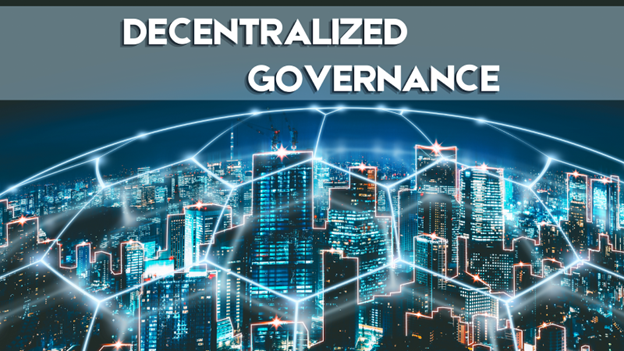0x12…qrst

As traditional structures falter, a digital revolution is rapidly reshaping our world, with decentralized blockchain governance emerging as its most radical and promising frontier. This isn’t just a technological shift; it is a fundamental re-imagining of power, offering a future where communities, not centralized entities, drive decision-making and control.
The digital age is not just changing how we communicate, work, and play but fundamentally altering the very structures of power and governance that underpin our societies. We stand at a historical turning point, a moment as transformative as the shift from monarchy to democracy or the societal upheavals of the Industrial Revolution.
This time, the catalyst is not a single invention, but a confluence of technologies – primarily blockchain and decentralized networks – that promise to redistribute power, enhance transparency, and foster a more participatory form of governance.
For centuries, governance has been synonymous with centralized authority. Whether embodied by monarchs, elected officials, or bureaucratic institutions, power has traditionally flowed from the top down.
Information, decision-making, and control were concentrated in the hands of a few. This model, while providing a degree of stability, often struggled with issues of accountability, responsiveness, and inclusivity. Citizens were, by and large, passive recipients of government services, with limited ability to influence the policies that shaped their lives.
The Enlightenment challenged this paradigm, sparking a wave of democratic reforms that emphasized individual rights and citizen participation. The rise of representative government, the separation of powers, and the concept of universal suffrage were all monumental steps towards a more equitable distribution of power.
Yet, even within democratic systems, centralized structures persisted. Information remained largely controlled by governments and powerful institutions, and the ability of ordinary citizens to meaningfully engage in decision-making was often limited.
The Industrial Revolution further complicated the landscape. The rise of vast industries and complex economies necessitated new forms of government regulation and oversight.
The concentration of economic power in the hands of corporations introduced new challenges to democratic governance. It raises questions about fairness, accountability, and the influence of private interests on public policy.
Today, the digital revolution is forcing us to confront these questions anew. The internet, initially hailed as a democratizing force, has, in many ways, reinforced existing power structures.
Tech giants control vast amounts of data and wield significant influence over online discourse and commerce. Governments struggle to regulate these digital behemoths, and citizens often feel powerless in the face of opaque algorithms and centralized control.
But within this digital landscape, a countercurrent is emerging. Blockchain technology, initially developed to support cryptocurrencies, offers a fundamentally different approach to managing information, assets, and even governance itself–decentralized blockchain governance.
At its core, blockchain is a decentralized, distributed ledger – a shared, immutable record of transactions that is accessible to anyone with an internet connection. This transparency and immutability have profound implications.
Imagine a world where government records – budgets, legislation, contracts – are publicly available and verifiable on a blockchain. Where citizens can track the flow of public funds, monitor the performance of government agencies, and hold officials accountable in real-time.
Where voting systems are secure, transparent, and auditable, eliminating concerns about fraud or manipulation. Where digital identities are controlled by individuals, not by corporations or governments, empowering citizens to manage their own data and privacy.
This is not a utopian fantasy but the logical extension of the principles that have driven democratic progress for centuries: transparency, accountability, and citizen participation. This is decentralized blockchain governance.
Decentralized networks, built on blockchain technology, offer the potential to create a more equitable and responsive form of governance, one where power is distributed, information is freely available and citizens have a direct voice in the decisions that affect their lives.
The Shiba Inu Operating System (Shib OS), while originating in the cryptocurrency space, provides a tangible, albeit unconventional, example of these principles in action.
Its emphasis on decentralization, community governance, and user empowerment, although applied in a different context, offers valuable insights into the potential of blockchain to reshape power dynamics. It’s a case study, a proof-of-concept, demonstrating how these technologies can be used to create more participatory and transparent systems.
This is not to suggest that blockchain is a panacea, or that the transition to a decentralized model of governance will be without its challenges. There are legitimate concerns about scalability, security and the potential for misuse. But the potential benefits – a more trustworthy, efficient, and citizen-centric government – are too significant to ignore.
The transition to a decentralized, blockchain-powered model of governance will not be instantaneous. It will require significant investment, careful planning, and a willingness to challenge long-held assumptions about power and authority.
But the current trajectory is unsustainable. Centralized systems, increasingly strained by inefficiency and a lack of public trust, are yielding to the demands of a digitally empowered citizenry.
The rise of blockchain and decentralized networks is not a passing fad rather a fundamental shift, a force reshaping the landscape of governance. Governments that embrace transparency, citizen participation, and the secure, equitable distribution of power will thrive in this new era.
Those that resist risk becoming increasingly irrelevant. The future is not preordained, but the potential for a more just, responsive, and truly democratic form of governance, powered by technology and driven by the people, is within our grasp.
The future of governance is decentralized, transparent, and inevitable. The only question is: are we ready?